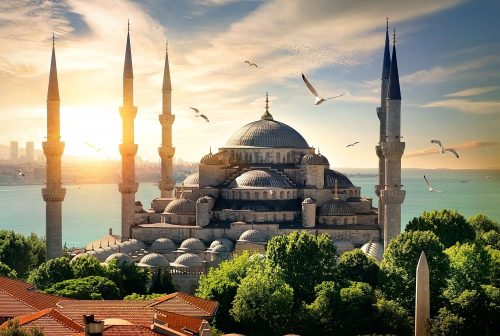
Lying within both Europe and Asia, Turkey offers a wide variety of landscapes and cultures. The West of the country has a true Mediterranean taste with sandy beaches and lovely creeks, while the mountainous and semi-arid East clearly belongs to the Occidental world. Majestic temples, mausoleums and other archaeological treasures are scattered across the country, bearing witness to an incredibly rich history. Exquisite, diverse, always plentiful, and at the heart of the culture, Turkish food reflects the different ethnic groups and the glorious past of the country. But Turkey’s most precious jewel is certainly its sublime capital city Istanbul.
HEALTH INFORMATION
We make every effort to ensure that the information posted on our website is up to date and accurate according to the latest public health recommendations; however, it is impossible for us to make changes on a daily basis.
For the most current travel health recommendations, please call our clinic as make an appointment with one of our travel health professionals.
TURKEY – RECOMMENDED VACCINES
| Hepatitis A | Recommended for all travelers. |
| Tetanus – Diphteria – Pertussis Vaccine | Tetanus: In exceptional circumstances (eg, stay in a region where access to health care is limited), for a person aged 18 years or older, 1 dose of DT may be given if 5 years or more has elapsed since the last dose. Otherwise, one booster dose at the age of 50*. Pertussis (Whooping Cough): 1 dose is recommended for pregnant women, for every pregnancy, regardless of immunization history and the interval since the last dose (betwen week 26 and 32). *Only applicable for Quebec. |
| Measles – Rubella – Mumps | Two doses recommended for all travelers born after 1970, if not previously given. |
| Flu – Influenza | Seasonal influenza occurs worldwide. The flu season usually runs from November to April in the northern hemisphere, between April and October in the southern hemisphere and year round in the tropics. Influenza (flu) is caused by a virus spread from person to person through coughing and sneezing or by touching infected surfaces. Everyone 6 months and older should get a flu vaccine yearly. Vaccine is recommended 14 days prior to departure. |
| Routine vaccines (dCaT, Polio, Meningococcal, Shingles, Pneumococcal, Hepatitis B, HPV, MMR & Varicella) | Recommended for all travelers |
| Typhoid fever | Recommended for most travelers, especially those who are staying with friends or relatives; visiting smaller cities, villages, or rural areas where exposure might occur through food or water; or prone to “adventurous eating” |
| Hepatitis B | Consider for most travelers; recommended for those who might be exposed to blood or other body fluids, have sexual contact with the local population, or be exposed through medical treatment (e.g., for an accident). |
| Tick-borne Encephalitis | Presence. All travellers should protect themselves against tick bites. |
| Lyme disease | Presence. All travellers should protect themselves against tick bites. |
| Rabies | For travelers at high risk of animal bites or being involved in activities with bats, dogs and other mammals. Clients who plan to visit remote areas may consider receiving this vaccine. Important to note the pre-exposure rabies vaccine is administered in 2 doses with one week interval between doses. Post-exposure vaccination is always recommended, even for those previously vaccinated. |
| Schistosomiasis | Avoid swimming in fresh water. |
RECOMMENDED MEDICATIONS
| Acetazolamide/Dexaméthasone | Recommended to prevent Acute mountain sickness (AMS). |
| Antibiotics Traveler’s Diarrhea | Azithromycin or Suprax |
MEDICAL CARE
In Turkey, the quality level of medical care is variable, depending on the hospitals and the geographical areas where they are located. The Mesa Hospital in Ankara and the International Hospital in Istanbul (which is affiliated to the HQS in the United Kingdom and the New York Presbyterian Hospital in the United States) are both modern and well equipped.
In case of emergency in Tunisia, call 112. You can also contact the International Hospital in Istanbul at 0212 663 3000 or the Bayindir Hospital in Ankara at 0312 287 9000 for a private ambulance.
The pharmaceutical products sold in Turkey are well regulated and controlled by the government. Pharmacists are well trained and can provide you reliable health care advice. But be aware that some specific treatments may be difficult to find. It is always safer to bring your own medical supplies in sufficient quantities.
SECURITY ABROAD
CANADIAN EMBASSY
Emergency services
In case of emergency, dial:
- police: 155
- gendarmerie: 156 (if you are in a rural area)
- medical assistance: 112
- firefighters: 110
